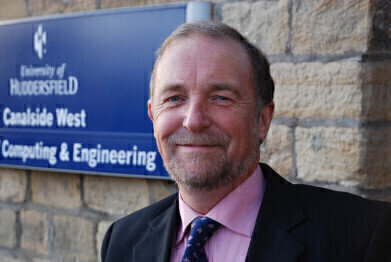-
 Professor Stephen Donnelly
Professor Stephen Donnelly
News & Views
Huddersfield to Advance Nuclear Materials Analysis with World-Leading Technology
May 21 2015
The Engineering and Physical Sciences Research Council (ESPRC) has awarded £3.5million to the research group headed by the University of Huddersfield’s Professor Stephen Donnelly for construction of an advanced facility for the analysis of nuclear materials. This will also bring the University into areas of space technology development.
Professor Donnelly developed the University’s existing and unique MIAMI (Microsope and Ion Accelerator for Materials Investigations) facility, which uses ion bombardment as a safe, non-radioactive means of simulating the effects of radiation damage on materials. The award will now fund the development of MIAMI II - an advanced electron microscope that has dual ion beams, meaning that it can simultaneously simulate two key aspects of neutron bombardment – the impact on the atomic structure of materials, and the internal damage caused by the build-up of gases – principally helium and hydrogen. This can severely weaken materials by creating a “honeycomb” effect.
“With our existing MIAMI, we can investigate these two issues sequentially,” explained Professor Donnelly. “But that isn’t same as what the neutrons are doing simultaneously. So MIAMI II, with a second beam line, will mean that we are more completely simulating the real effect of nuclear reactors.”
The new machine will also be much more versatile than its predecessor and have enhanced analytical capability, continued Professor Donnelly, who anticipates that MIAMI II will lead to research collaborations with scientists from around the world.
Nuclear science is likely to continue as the main area of investigation, but other fields will develop, including nanotechnology and space research. “Any vehicle, or anything sent anywhere into space – whether into earth orbit or interstellar space – is being bombarded by energetic particles. So there are potential applications for MIAMI II in that area,” said Professor Donnelly.
MIAMI II, ranked second out of more than 180 applications that were considered by an EPSRC panel, will be constructed within 12 months and is expected to be fully operational shortly after.
Digital Edition
Lab Asia 31.2 April 2024
April 2024
In This Edition Chromatography Articles - Approaches to troubleshooting an SPE method for the analysis of oligonucleotides (pt i) - High-precision liquid flow processes demand full fluidic c...
View all digital editions
Events
Apr 24 2024 Jakarta, Indonesia
Apr 25 2024 Istanbul, Turkey
Apr 28 2024 Montreal, Quebec, Canada
May 05 2024 Seville, Spain
InformEx Zone at CPhl North America
May 07 2024 Pennsylvania, PA, USA

















